Open letter to Tim Cook: Apple needs to be more like Google
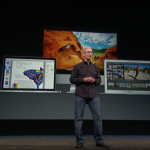
Mr. Cook,
Apple has a big problem. The news media and technorati treat your company like Microsoft. Can you say "has-been?" For nearly 15 years, the company that Bill Gates built could do no right. Every seeming innovation met fierce criticism. Today, tongues wag about how Apple has lost its way under your leadership and how the days of innovation are over.
Nexus 7 wins, iPad mini loses
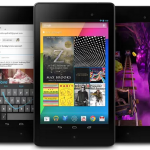
Rest in peace, iPad mini. Google killed you. The question then: Is it murder or manslaughter -- or justified homicide, putting the Apple tablet out of our misery?
Three days using the new Nexus 7, I can't imagine why Apple let Google, and partner ASUS, seize back-to-school buying with the tablet. I don't refer just to the instrument of destruction but the means. The 2013 edition is widely available through major US retailers, including Amazon and Best Buy. By all indications there is inventory to meet demand, not the typical supply shortages, although the 32GB WiFi model is unavailable this weekend from many retailers -- but Google Play is stocked.
Chromebook Pixel is Microsoft's worst nightmare come true -- and Apple's, too
The rumors were true! Google developed a touchscreen Chromebook for release this year. Like today! No one should misunderstand what the computer means competitively. Already, four Microsoft Windows partners produce Chromebooks -- Acer, HP, Lenovo and Samsung. Chromebook Pixel promises to do for the Chrome OS platform what Nexus devices did for Android smartphones and tablets: Establish a reference design for hardware partners and provide developers base system to develop apps for the platform. But it's also a competitive move against PCs running OS X or Windows and Google pushing Chrome OS into the premium notebook market.
Today Google unveiled Chromebook Pixel, following weeks of rumors. The company also extended a vision for Chrome OS. Bottom line: Commitment to the operating system is strong. The search and information giant briefed journalists in different cities. I had to turn down an invite to the San Francisco briefing because of family matters. Do I feel left out! But, hey.
Android is winning the mobile platform wars
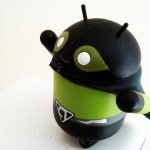
Some days the sorry state of news reporting really baffles me. Today I read numerous headlines claiming that Android tablet share surged past 50 percent in Q4, usurping iPad -- all using numbers I wrote about a day earlier. The one on CNN -- "IDC says Android is the new king of tablet market share" -- got to me. Immediate reaction: "What did I miss?" But in looking over the numbers, nothing really jumped out that IDC said any such thing. Sure iPad shipment share fell to 43.6 percent from 51.7 percent annually and from 46.4 percent sequentially. I chose to ask the analysts rather than follow the feeding frenzy.
"Android actually passed the 50 percent mark in 3Q 12", Tom Mainelli, IDC research director for tablets, says. Whoa, there's no new king at all. Android took the crown last summer. Still, that's a phenomenal achievement, setting me to write a story I couldn't imagine a year ago.
My Apple boycott is over
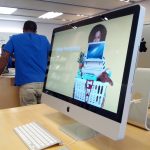
Suddenly, I feel sorry for the folks over at Apple. Chicken Little bloggers and Wall Street analysts run round crying "The sky is falling!" Strangely, they are believed. Apple shares are down 38 percent from September's all-time high. On Friday, the company's market cap fell below Exxon's. Suddenly, the world's most valuable company isn't. I just don't feel right kicking fruit as it falls down, so as a gesture of goodwill my boycott ends today.
That's not to say I have plans to buy any Apple products. I'm more than satisfied with Chromebook and my three Nexus devices. That said, as an act of solidarity, I let Apple auto-charge my credit card for iTunes Match renewal today. I don't own a single device that supports the service, but, hey, what's $24.95 between friends? I was a loyal OS X and iOS user until my boycott started in June 2012, protesting aggressive patent lawsuits -- unaffectionately called innovation by litigation.
You can have iPhone 5, I'll take Google Nexus 4
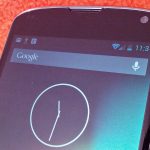
I can see only one good reason to choose iPhone 5 over Nexus 4: The LG-manufactured mobile is sold out, and you can't wait. For the patient, Google's fourth-generation stock Android delivers rewarding experience. The new Nexus is the smartphone to buy this holiday season -- if you can find one.
Two reasons stand in iPhone 5's favor, neither is good, just necessary for some people: Your carrier -- for example, Sprint and Verizon in the United States -- isn't supported (Nexus 4 is GSM/HSPA+), or you bought heap loads of apps from Apple and don't want to lose your investment. I feel your pain, but offer no pity. Nexus 4 is exceptional.
Eight things Google should be thankful for in 2012
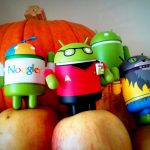
US Thanksgiving is a time for reflection on the year behind, with plenty of time to ponder resolutions for January 1st. Yesterday, I posted about the things Microsoft should be grateful for in 2012. Today, I followed up with another, for Google. For consistency's sake, the list numbers eight, in line with Microsoft's, for which I chose to hat-tip Windows 8.
The list is by no means comprehensive, just some things that stand ahead of others -- and it is organized from least to most important. Google had a great year, perhaps the best ever. Few companies released more innovative products, affecting so many people and building such positive brand awareness.
Three out of four smartphones ship with Android

Android's ascension over iPhone reached the figurative stratosphere during third quarter, according to IDC. Seventy-five percent of smartphones shipped with the operating system -- that's up from 57.5 percent a year earlier. By comparison, iOS nudged up to 14.9 percent, from 13.8 percent. That's right, little more than 1 percent. There's a reason that in September I asserted "Android wins the smartphone wars". There's certain appropriateness to IDC releasing the data on Day of the Dead.
Out of fairness to Apple, iPhone unit volumes rose considerably more, 57.3 percent, than market share reflects -- 26.9 million units compared to 17.1 million a year earlier. Android shipments rose 91.5 percent; 136 million, compared to 71 million in Q3 2011. Still, Android volumes in the quarter exceeded that for all smartphones in 2007. My how the market has changed.
Half of Apple devices already run iOS 6

Today, during a special media event, Apple CEO Tim Cook revealed that 200 million devices already have iOS 6. That works out to half cumulative shipments -- 400 million. The company may update that number during its quarterly earnings call in two days.
The number starkly contrasts with Android, where just 1.8 percent of devices are on newest version Jelly Bean. The difference demonstrates the extent of operating system fragmentation of one versus the other. Uniformity offers many advantages to developers and customers using their apps. Consider this: Jelly Bean released in mid-July, iOS 6 last month. So Apple reaches considerably more users with its newest OS than does Google. There is no comparison.
Who puts faith in Apple, who in Google

Some companies really know how to maximize marketing, and drive up their share price in the process. In March, Apple used a countdown clock to boast about 25 billion App Store downloads. Google's mobile store reached the same number this week, announced with little fanfare today.
Apple shares traded for about $531 then, but rose sharply following the app milestone and thereafter fairly consistently in the wake of a series of well-marketing managed announcements or product releases, topping $700 this month. There are daily reports across the InterWebs about record share price. Meanwhile, more meager marketer Google, which share price also flies record high this month -- above Apple, at $764.89 peak -- is largely ignored. Perhaps pro-Apple bias contributes to the silence? Whatever, Google has big numbers of its own.
Is patent peace possible in our lifetime?

Late this afternoon, in response to Motorola's requested, massive Apple product ban, Dan Gillmore posts to Google+: Come on, Google, don't abuse the patent system the way Apple does. Sheesh". I've seen similar sentiments expressed elsewhere. Gillmore and others are wrong. Google isn't playing Apple's game, but trying to end it. If Apple won't negotiate willingly, a show of force may be the only way to achieve patent peace.
Motorola Mobility is now a Google subsidiary, so legal demand from the one really comes from the other. From one perspective, the request is so sweeping as to dwarf any of the claims Apple makes against competitors like HTC and Samsung. Moto seeks a ban on virtually every Apple device -- iOS or OS X -- sold in the United States. It's reasonable to look at Google and to question whether the tactics are heavy-handed. They are not.
No longer an iOS pack-in, YouTube app update brings ads

Ahead of the Apple event rumored to be the unveiling of a new, smaller iPad, Google on Tuesday released an updated native YouTube application for Apple's smaller-screen iOS devices.
The new application for iPhone and iPod touch speeds up video discovery with an improved channel guide and search functionality, improved sharing capabilities, and a larger roster of compatible videos.
'The Android operating system, clear and of itself was not something that infringed'
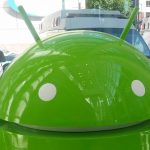
I'm watching a video interview Bloomberg's Emily Chang conducted with Apple-Samsung trial foreman Vel Hogan three days ago. At 9:17, he makes a provocative statement: "The Android operating system, clear and of itself, was not something that infringed".
Do you believe him? I ask, because pundits fell over themselves this week claiming that the jury verdict means big trouble for Android and Google.
YouTube app disappears from latest iOS 6 beta, Apple says license has 'ended'
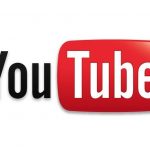
Apple's divorce from Google is nearly complete: say goodbye to the native YouTube app. The change came within iOS 6 Beta 4 which released to testers on Monday. The reasons for the move are unclear: little was said other than the license to carry YouTube in iOS had expired.
Monday's news follows Apple's decision to dump Google Maps in favor of its own in-house solution. As competition heated up in the smartphone sector and Google's Android gained more market share, the two companies have begun to distance themselves from one another.
Google Jelly Bean smokes Apple Siri
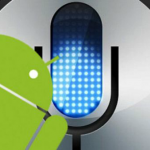
A week has passed since I started up my Google I/O-issue Galaxy Nexus and updated to Android 4.1 (aka Jelly Bean). Since then, my daughter and I faced off Google's Voice Assistant against Siri (on her iPhone 4S). The results aren't surprising. Google's depth as a search provider proves its wherewithal against Apple, which calls Siri a personal assistant. But Jelly Bean's feature, used alongside Google Now, is every bit more and every bit what a digital assistant should be. Siri sucks even more, by comparison.
I will be absolutely clear: Together, Voice Assistant and Google Now represent a watershed development, living up to what Apple promises with Siri. Google has successfully presented its depth of search in a truly meaningful manner -- one that can change how people interact with mobile devices. If execution improves over time, particularly as Google Now learns personal habits, these innovations could be as important to the search giant as the development of its algorithm.
Recent Headlines
Most Commented Stories
BetaNews, your source for breaking tech news, reviews, and in-depth reporting since 1998.
Regional iGaming Content
© 1998-2025 BetaNews, Inc. All Rights Reserved. About Us - Privacy Policy - Cookie Policy - Sitemap.